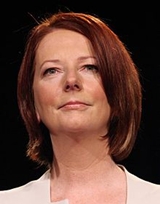|
Australia's Julia Gillard government has introduced a new carbon tax from 1 July amid stiff resistance from the opposition and business groups, aiming to cut the country's carbon emissions by 5 per cent by 2020.  Through the introduction of the new tax, Australia joins several other countries that have implemented carbon taxes or energy taxes in relation to carbon emissions. Through the introduction of the new tax, Australia joins several other countries that have implemented carbon taxes or energy taxes in relation to carbon emissions.
The country's coalition Labour government says putting a price tag on pollution is the best way to dissuade polluting entities from emitting greenhouse gases. The carbon pricing in Australia applies to nearly 300 of the country's largest entities that emit more than 25,000 tonnes of greenhouse gases annually including world's largest miner BHP Billiton, the country's largest power generator Macquarie Generation etc. During the first three years beginning 1 July 2012 the pricing will be set by the government, beginning with A$23 per tonne of carbon dioxide which will increase by around 5 per cent annually. From 1 July 2015, it will be changed to an emission trading scheme which will be controlled by the Clean Energy Regulator, and the pricing will be set by the market. Thousands of people marched the streets of Sydney yesterday to protest against the new carbon tax. The opposition led by Liberal party leader Tony Abbot said that the new tax is an additional burden during the hard times. Abbot said that if he is elected there will be no carbon tax under a government he leads. "On day one of the new parliament, the carbon tax repeal legislation will be introduced," he told reporters in Melbourne. It will hit every Australian family's cost of living, it will make every Australian job less secure and it won't actually reduce emissions," Abbot said. Prime minister Julia Gillard said Abbot would not deliver on his promise to finish with the carbon tax. ''Businesses have got themselves ready for carbon pricing. New investments have been made. Against all of that backdrop, Abbot will find himself in a position where he cannot go to the next election pretending anything else than carbon pricing is going to stay,'' Gillard told ABC TV yesterday. Business groups said that the tax would be detrimental to the economy as it would make Australian business less competitive. The first country to bring in carbon tax was Finland in 1990. Subsequently other countries including The Netherlands, Sweden, Denmark, Switzerland, UK, Ireland, South Korea, some states of the US, some provinces in Canada joined the group, among others. Australia's per capita emission is the highest in the developed world - more than the US, twice that of the UK, and around five times that of China. And it is expected to rise at a rapid rate of around 2 per cent annually, without any action. Australian treasurer Wayne Swan said in an economic note yesterday: ''From today, we begin to break the link between emissions growth and economic growth by putting a price on carbon pollution. This is the most effective and efficient way to drive innovation to find better, less-polluting ways of producing power, goods and services.'' The action will help reduce the country's annual emissions by at least 159 million tonnes per annum by 2020, equivalent to taking 45 million cars off the road, Swan said. The government also vowed to help expand the clean energy sector through targeted investments. This will include a $3.2 billion Australian Renewable Energy Agency to support new technologies in the sector, working alongside the $10 billion Clean Energy Finance Corporation. The funding together with the carbon tax will facilitate around $100 billion investment in the renewable sector over the next four decades, Swan said. To compensate for the cost of living impact of the carbon price on households, the government will allow a tax cut to over 7 million Australians with annual income of up to A$80,000 a year. Simultaneously the government has introduced a new mineral resource rent tax (MRRT) effective yesterday aiming to spread the benefits of the mining boom across the nation's economy. The funds generated would be invested in infrastructure, and to help small businesses, and provide relief to low and medium income families through higher payments and allowances. The MRRT is expected raise over A$13 billion to 2015-16 and will apply to the mining of iron ore and coal in Australia, at a rate of 22.5 per cent. The background Australia's Liberal coalition government led by John Howard and the Labour party opposition led by Kevin Rudd vowed to implement an emission trading scheme (ETS) before 2007 election. In 2007, when Rudd came into power, he gained support from Liberal leader Malcom Turnbull to go ahead with the scheme, but Liberal party's Tony Abbot, who opposed the ETS, defeated Turnbull in a leadership challenge, resulting in the withdrawal of the bill. In 2010, Labour party's Julia Gillard defeated Rudd in a leadership contest. In her campaign for the 2010 federal election, she said that she would proceed with the carbon pricing if elected. Nevertheless, the Labour party could not get an absolute majority in the election and had to get support to form the minority government from crossbenchers including the Greens, which pressed for a clean energy policy. Subsequently, a parliamentary committee was established by the Gillard government which agreed on a carbon tax commencing 1 July 2012.
|